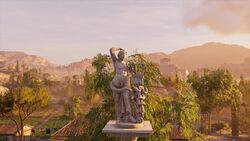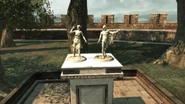Sadelyrate (talk | contribs) (Whoah, this is missing stuff. Added some.) |
Sadelyrate (talk | contribs) (Adding categories) |
||
| Line 31: | Line 31: | ||
[[Category:Roman deities]] |
[[Category:Roman deities]] |
||
[[Category:Twins]] |
[[Category:Twins]] |
||
| + | [[Category:Poets]] |
||
| + | [[Category:Oracles]] |
||
| + | [[Category:Musicians]] |
||
Revision as of 20:06, 14 December 2018

|
Patience, brothers. Soon we will reveal the secrets of Assassin's Creed: Odyssey. This article has been identified as being out of date. Please update the article to reflect recent releases and then remove this template once done. |

|
Where are the paintings? This article is in need of more images and/or better quality pictures from official media in order to achieve a higher status. You can help the Assassin's Creed Wiki by uploading better images on this page. |

Statue of Apollo in Apollonia
Apollo is the ancient Greek and Roman god of music, sunlight, poetry, art and knowledge. He is the son of Zeus and Leto, and the twin brother of Artemis/Diana; Apollo is the father of Asklepios, the god of healing, and thus the grandfather of Hygieia. He is also regarded as one of the Twelve Gods, the major deities of the Greek pantheon.
Influence
In Ancient Greece Apollo was said to have slain the mighty snake Python near the Sanctuary of Delphi. Following the snake's death within a temple, its skeleton was left there as a reminder, and the occupation of Pythia was born. During the Peloponnesian War in the 5th century BCE the Spartan misthios Kassandra explored the area.[1]
When the Greeks founded the colony of Cyrenaica in Africa, they brought the worship of Apollo along, building a temple complex in the city of Cyrene. By the 1st century BCE, Apollo was still widely worshipped by ancient Greeks, who regarded him as the patron god of the city.[2]
An oracle of Apollo was also based in Cyrenaica, with its sanctuary situated in the Green Mountains region.[2]
During the Renaissance the Villa Auditore in Monteriggioni had a statuette featuring Apollo. It was paired with one of his sister Diana.[3]
Gallery
Appearance
- Assassin's Creed II (statue only)
- Assassin's Creed: Origins (statue only)
- Assassin's Creed: Odyssey (statue only)

